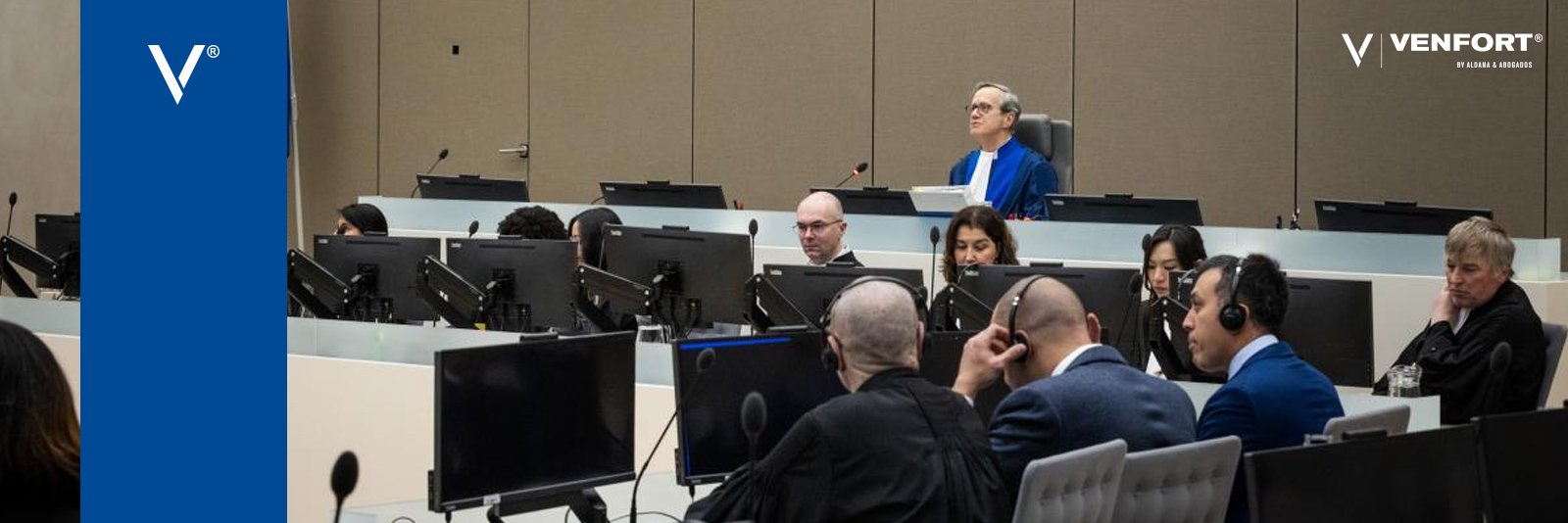Investigations into genocide, crimes against humanity, war crimes, and crimes of aggression –the four crimes covered by the Rome Statute– can have very serious consequences for the accused: preventive detention, international arrest warrants, and even trials before the International Criminal Court (ICC).
These procedures are complex and governed by strict international rules and jurisprudence.. Venfort Abogados, under the direction of Dr. Alan Aldana, a lawyer accredited before the international court, has a team recognized before the ICC and more than 20 years of experience in international criminal law. Our goal is to protect your rights and ensure that every appeal or motion is filed with the utmost rigor and specialized knowledge.
Crimes under the Rome Statute
The ICC has exclusive jurisdiction over the most serious crimes of concern to the international community as a whole. According to the Rome Statute, these crimes are:
- Genocide: acts committed with the intent to destroy, in whole or in part, a national, ethnic, racial, or religious group. These acts include killing members of the group, causing serious bodily or mental harm to members of the group, deliberately inflicting on the group conditions of life calculated to bring about its physical destruction in whole or in part, imposing measures intended to prevent births within the group, or forcibly transferring children of the group to another group[1].
- Crimes against humanity: acts such as murder, extermination, enslavement, deportation, imprisonment, torture, rape, and persecution, when committed as part of a widespread or systematic attack against the civilian population. They also include enforced disappearance, apartheid, and other inhumane acts causing great suffering[2].
- War crimes: serious violations of the Geneva Conventions and other serious violations of international humanitarian law committed in the context of an armed conflict. These include, among others, intentional killing, torture, biological experiments, forced displacement, hostage-taking, and deliberate attacks on civilians or civilian property[3].
- Crime of assault: the planning, preparation, initiation, or execution of an act of aggression by a person with the capacity to control or direct the political or military action of a State. An act of aggression is understood to mean the use of armed force in violation of the Charter of the United Nations, such as invasions, bombings, blockades, or attacks against the sovereignty of another State[4].
Understanding the types and elements of these crimes is the first step in designing an effective defense strategy before the ICC.
Why is a strong defense vital in court investigations?
Proceedings before the ICC are governed by complex procedural rules and the principle of complementarity., according to which the Court will only intervene when States are unwilling or unable to genuinely investigate. Case law is evolving rapidly; for example, the Appeals Chamber has confirmed that confirmation of charges hearings may be held in the absence of the accused when he or she cannot be located despite reasonable efforts[5]. It has also ordered the Prosecutor to recuse himself due to a conflict of interest in the investigation into Venezuela. These decisions show the importance of having a detailed knowledge of the Rome Statute, the rules of procedure, and the Court's doctrine, as well as of anticipating the strategies of the Office of the Prosecutor.
In this context, an expert defense must not only master the elements of the crimes set forth in Articles 6, 7, 8, and 8 bis of the Rome Statute, but also understand the interaction between national and international jurisdictions. A swift response and the preparation of a well-founded appeal can make the difference between an unfair conviction and the effective protection of your rights.
Our ICC-accredited team
At Venfort Abogados, we have a multidisciplinary team accredited to appear before the International Criminal Court and the main international courts.. This team combines practical experience, academic excellence, and geopolitical sensitivity. We highlight the key profiles that lead our defenses:
Management and coordination – Dr. Alan Aldana.
Venezuelan criminal lawyer, accredited before the International Criminal Court and Spain. He is an international partner at VENFORT LAWYERS and has more than twenty years of experience in international criminal law and judicial cooperation. He has led defense strategies in transnational prosecution cases, extraditions, and proceedings before INTERPOL. His in-depth knowledge of the Venezuelan and Latin American context, combined with his experience before European institutions, allows him to build bridges with the international legal community, ensuring a technically sound and diplomatically prudent defense.
Academic advising and strategy – Prof. Dr. Ludovic Hennebel.
Professor of International Law at Aix-Marseille University and Director of the Institut d’Études Humanitaires Internationales (IEHI). He is also Co-Director of the European Master's program “NOHA – Action et Droit Humanitaires.” A recognized authority in international criminal litigation, he has advised on complex cases involving senior government officials and transnational persecution. His participation brings the highest level of technical rigor, academic support, and understanding of the geopolitical context.
International and economic criminal law – Eduardo Mora Rodríguez.
Partner at Venfort Abogados since 2015. Before joining the firm, he was a prosecutor for the Public Prosecutor's Office in Caracas and a career civil servant in the Caracas Criminal Court Circuit. He specializes in international criminal law and economic criminal law, with a postgraduate degree from the Latin American and Caribbean University and doctoral studies in criminal law. His practice areas include criminal procedural law, international criminal law, economic criminal law, and regulatory compliance.
In addition to these figures, we have lawyers accredited before the International Criminal Court who are experts in procedure and jurisprudence., as well as with former judges and prosecutors who know judicial practice from the inside, specialists in international criminal law, experts in extraditions and proceedings before INTERPOL, and experienced lawyers before the Court of Justice of the European Union and the European Court of Human Rights. All of them work in a coordinated manner to offer comprehensive and personalized defense.
Our appeals technique
Success in an appeal does not depend solely on restating the facts.. It requires identifying errors of law (incorrect interpretation of the law), procedural incidents (violations of the right to defense), and disproportionalities in the assessment of evidence. Our method focuses on:
- Thorough review of the fileWe analyze each document, ruling, and decision, as well as the proceedings of the hearing. We look for inconsistencies, omissions, or violations of rights.
- Solid legal argumentation: We apply recent doctrine and jurisprudence. For example, we cite decisions from the Appeals Chamber that clarify concepts such as holding hearings in absentia or the impartiality of the prosecutor.
- Coordination with expertsWe have experts, criminologists, and analysts who provide technical reports to support our arguments.
- Strategic approach: we assess whether it is better to file an appeal, a motion to dismiss, or to take the case to international human rights courts. A swift response is key to avoiding preclusive deadlines.
Thanks to this technique, at Venfort Abogados we have proven through experience that a well-founded appeal can change the course of the proceedings or significantly reduce penalties.
Recent cases and case law
Keeping up to date is essential. Our team constantly studies the rulings and case law of the ICC and other international courts. Among the most recent are:
- Joseph Kony case (June 3, 2025): The Appeals Chamber confirmed that a confirmation of charges hearing may be held in absentia if the accused cannot be found[5]. This ruling underscores the need to actively participate in the process from the investigation stage and reinforces the importance of international cooperation.
- Situation in Venezuela I (August 1, 2025): the Appeals Chamber ordered the Prosecutor to recuse himself due to a conflict of interest[6]. This precedent shows that the Prosecutor's impartiality is a valid argument for the defense and may be subject to appeal.
- Situation in the State of Palestine (October 17, 2025): The Appeals Chamber rejected by majority vote the victims' requests to submit observations in an appeal concerning the investigation in Palestine, emphasizing that the participation of victims is not automatic and is governed by strict procedural requirements[9].
Why choose Venfort Lawyers?
Choosing Venfort Abogados means having a trusted legal team in the field of international criminal law. We offer:
- We combine technical expertise with immediate assistance.Our team, accredited by the International Criminal Court, has proven experience in cases and is always available to advise you at every stage of the process, from preliminary studies and investigations by the Prosecutor's Office to trial before the international court.
- International coverage: partnerships with law firms in Europe, Asia, and Latin America to coordinate extraditions and interviews with consular authorities.
- Confidentiality and discretionWe understand the sensitivity of these matters and act with complete discretion.
Conclusion and call to action
If you are under investigation for any of the crimes under the jurisdiction of the ICC—genocide, crimes against humanity, war crimes, or crimes of aggression—don't wait. A specialized defense and the filing of the appropriate appeals are crucial to protecting your freedom and reputation. At Venfort Abogados, under the direction of Dr. Alan Aldana and with a team accredited before the International Criminal Court, we put our knowledge and passion for justice at your disposal. Contact us today for a confidential consultation and find out how we can help you.
[1] [2] [3] [4] Rome Statute of the International Criminal Court.
[7] [8] Eduardo Mora – Venfort













